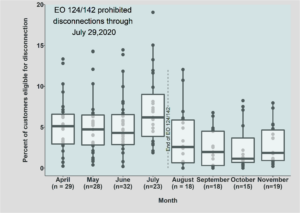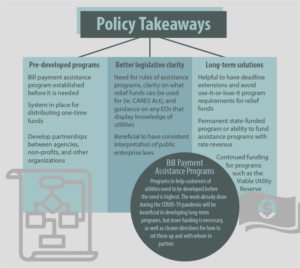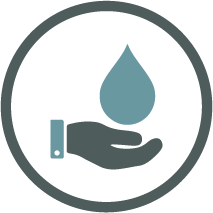Over the past 6 months*, the EFC has continued to investigate how utilities across NC are faring as the ongoing pandemic continues to create a variety of challenges related to revenue and operations. The big picture takeaway is that some things are improving while some things remain the same. Many utilities continue to feel a variety of impacts from COVID-19 on utility revenues and practices, some utilities are transitioning to pre-pandemic billing practices, and some utilities will be providing funds for bill payment assistance to customers who have past due bills.
This week, the EFC is releasing a report, funded by the NC Policy Collaboratory, that details some of the on-going impacts on water and wastewater utilities that have resulted from COVID-19 and the implementation of NC’s Executive Orders 124/142, which prohibited disconnection of residential customers and mandated the establishment of payment plans. As part of its research, the EFC interviewed staff from 16 different utilities and collected survey responses from a total of 34 utilities between August and December 2020. This research included utilities across the state that varied in size from 42-300,000 accounts and which had a wide variety of financial health characteristics.
The EFC research found that many utilities experienced lost or delayed revenue due to changes in consumption patterns and customers not paying past due bills. Some of the delayed revenue has since been recovered, as a result of customers paying their outstanding balances once utilities resumed disconnections for non-payment. Some utilities resumed disconnections after the Executive Orders 124/142 expired in July, though others have voluntarily continued to not use disconnections.

The EFC research additionally highlights that for most utilities, it took significant effort for staff to set up payment plans, communicate with customers, enroll customers in payment plans, and apply payments to past due bills and current bills. Most of this effort occurred in August/September/October, but staff are still making efforts to reach out to customers who haven’t paid outstanding balances or communicated with the utility about past due bills.
There is still uncertainty as to how the COVID-19 pandemic will continue to affect utilities; however, this crisis has brought to light the need for consistently high-functioning and fully operational water and wastewater utilities, especially during a public health crisis. It is essential that decision makers consider ways to make water and wastewater utilities more resilient (financially, physically, and socially), so they can withstand the next difficulty – whether it be a pandemic, hurricane, flood, or drought. Ongoing support for the long-term viability of utilities in addition to well-crafted and distributed emergency relief could provide lasting benefits and improve a utility’s ability to address local challenges.

The COVID-19 pandemic is not over. The impacts of changed consumption patterns will likely persist in some places, and the continued distribution of funds and payments (or lack thereof) on payment plans will remain a challenge for people involved with bill assistance programs and payment plans. However, the number of customers who have not communicated with their utility about past due bills is growing smaller, and some utilities are increasing support for customers who have a hard time paying their bills. Additionally, the EFC and the School of Government remain resources for utilities and decision makers as they navigate this ongoing challenge.
How can the EFC help?
The EFC has developed a COVID-19 Revenue Impact Estimator tool to add to its typical suite of tools that can help water and wastewater utilities with financial decision making. This tool can help estimate net loss (or change) of revenue under COVID-19 pandemic working conditions over a two-year period. Users can start with financial and water use data from the most recent year prior to the pandemic (e.g. 2019) as a baseline, and then enter the changes experienced or expected as a result of the COVID-19 working conditions. A user will have the option to enter two scenarios, which can represent different possibilities for changes in the coming months.
Additionally, under a grant funded by the Environmental Protection Agency, the EFC can offer free technical assistance to drinking water utilities that serve 10,000 customers or less. Reach out to mullins@sog.unc.edu.
Let us know what you think!
Did your utility feel the impacts of COVID-19 in some of the ways outlined here or in the report? What are ways to support the long-term viability of utilities? How can the EFC assist your utility or organization?
*For a summary of impacts from COVID-19 from March to July of 2020, see our previous blog post and/or previous report here.
Elsemarie Mullins joined the EFC at UNC in 2020. In her role as Project Director, she conducts applied research and provides technical assistance and training for environmental service providers. Elsemarie completed her M.S. in Geological Sciences at UNC in 2018, and holds a B.S. from Wheaton College in Environmental Science.





Has EFC tracked stimulus funds available to support utility bills directly, and what can be done by utilities to claim these funds to support customers who are in arrears?
Hi Dante. Yes. We’ve just posted about that: https://efc.web.unc.edu/2021/02/22/federal-relief-for-water-bills-covid-19/